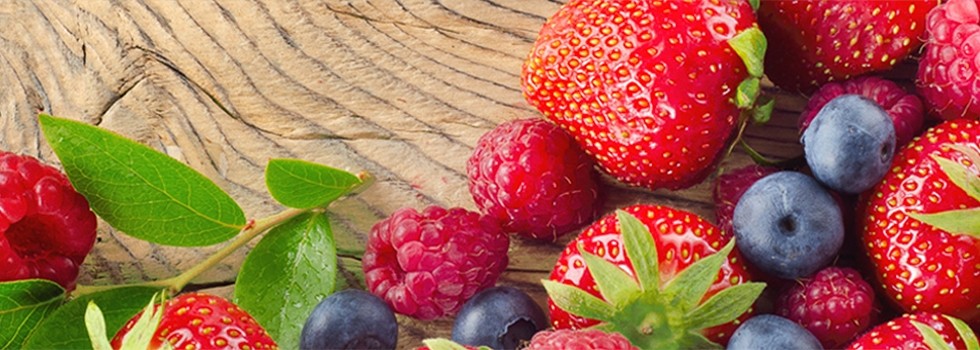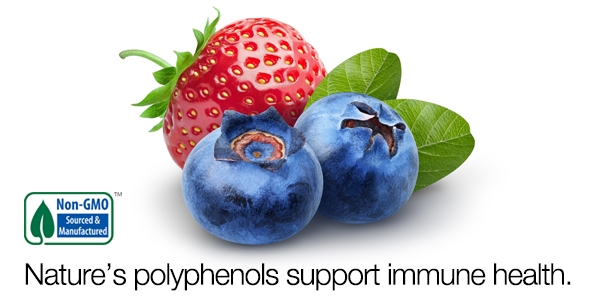Promotional Features
Polyphenol-C: a new premium vitamin-C provides wide-spectrum berry polyphenols for enhanced immune support
It’s been known for centuries that eating fruits prevented scurvy, but it wasn’t until 1930 Albert Szent-Gyorzi was awarded the Nobel Prize for discovering the identity of the vitamin-C molecule. The name given to it, ‘ascorbic acid’ literally means ‘anti-scurvy’.
Since then, vitamin-C has become one of the most widely used supplements in the world. Though few people need it today for the prevention of scurvy (due to the wide availability of fruits in our diet), vitamin-C is taken for its numerous other benefits and essential functions in the human body. This includes support for a strong immune system: more than half a century of research has shown vitamin C to be a crucial player in immune system support, and immune cell function [1].
Non-GMO Vitamin-C and Polyphenols: the colors of health
Nature delivers vitamin-C to us in the colorful packages of fruits and berries. The deep purples, blues and reds comprise the polyphenol components of these fruits: anthocyanins, proanthocyanidins, bioflavonoids and others.
These compounds enhance the role of vitamin-C, and are the most abundant source of antioxidants in our diets. Anthocyanins are the primary active forms found in fresh berries such as blueberries, blackberries, raspberries and strawberries. These compounds also play important roles as immune enhancers, in anti-inflammatory activity, cardiovascular support and many other health functions [2,3].
A unique synthesis of natural ingredients
The new Polyphenol-C product is the result of years of work by ENI into the sources and analysis of polyphenols. This includes the development of VinCare, ENI’s patented whole grape extract. Vincare was the subject of a clinical trial published in The Journal of Functional Foods that demonstrated its’ beneficial role in improved antioxidant status and cardiovascular support [4]. Other recent studies have pointed to potential mental acuity and brain support benefits of grape and blueberry polyphenols.
VinCare is a primary source of polyphenols in Polyphenol-C that also contains Cranberex, a highly concentrated cranberry extract containing cranberry’s unique A-Type proanthocyanidins (PAC’s) [5]. This ingredient was also the subject of a study at Rutgers University, showing its high level of beneficial activity. Other polyphenols in Polyphenol-C are sourced from blueberry, blackberry, raspberry and strawberry.
Cal Bewicke, CEO of ENI stated: ‘Today and for the future people are looking for improved immune and health support products. With Polyphenol-C we’ve made another step in bringing a more complete spectrum of nature’s ingredients into one product.’
In the formula for Polyphenol-C, each gram contains 600mg of Non-GMO vitamin-C and 400mg of fruit extracts/concentrates standardized to 25% polyphenols (100mg total polyphenols).
Polyphenol-C is manufactured in ENI’s solar-powered, NSF certified facility in California.
------
References:
[1] Jacob RA, Sotoudeh G. Vitamin C function and status in chronic disease. Nutr Clin Care 2002;5:66-74. [PubMed abstract][2] Zafra-Stone, S. et al. (2007). Berry Anthocyanins as novel antioxidant in human health and disease prevention. Mol. Nutr. Food Res. 51, 675 – 683.[3] Bell, D.R., & Gochenaur, K. (2006). Direct vasoactive and vasoprotective properties of anthocyanin-rich extracts, J Appl Physiol, 100 (4), 1164-70.[4] Evans, M., et al. (2014). A randomized, double-blind, placebo-controlled, pilot study to evaluate the effect of whole grape extract on antioxidant status and lipid profile. Journal of Functional Foods. 7. 10.1016/j.jff.2013.12.017.[5] Foo, L.Y., et al. (2000a). A-type proanthocyanidin trimers from cranberry that inhibit adherence of uropathogenic P-fimbriated Escherichia coli. J. Nat. Prod. 63, 1225–1228.





